THE PERIODIC TABLE OF CINEMA: Dennis Undergoes Professor Kelp's Endless Summer Chemistry Test
Enough procrastinating! I've read the questions. Here are my answers.
1) Does film best tell the truth (GODARD) or lies (DE PALMA) at 24 frames per second?
 If movies are more than just as a series of flashing lights and loud sounds designed to distract us in multiplexes or airplanes from the inconvenient demands of individual thought, then it seems truth has to be the correct answer. But film, even on its most purely documentary level, is subject to all kinds of manipulation and falsehoods—lies, in other words-- that can, paradoxically, come together through design or luck to form a kind of truth that reflects a perspective on the human condition.
If movies are more than just as a series of flashing lights and loud sounds designed to distract us in multiplexes or airplanes from the inconvenient demands of individual thought, then it seems truth has to be the correct answer. But film, even on its most purely documentary level, is subject to all kinds of manipulation and falsehoods—lies, in other words-- that can, paradoxically, come together through design or luck to form a kind of truth that reflects a perspective on the human condition. Whether the resulting film adds up to consciously crafted art, or even found art emerging from documented experience or down-and-dirty exploitation, or even merely artfully arranged entertainment, it seems to me true that Godard and De Palma, like every other director, can be said to be both truth-tellers and shameless liars. It’s up to us to decide whether their lies add up to truths worth telling that are profoundly expressed, truths meant to prop up the reputations among true believers, or just more plain old lies for general consumption.
Whether the resulting film adds up to consciously crafted art, or even found art emerging from documented experience or down-and-dirty exploitation, or even merely artfully arranged entertainment, it seems to me true that Godard and De Palma, like every other director, can be said to be both truth-tellers and shameless liars. It’s up to us to decide whether their lies add up to truths worth telling that are profoundly expressed, truths meant to prop up the reputations among true believers, or just more plain old lies for general consumption. 2) Ideal pairing of actors/actresses to play on-screen siblings

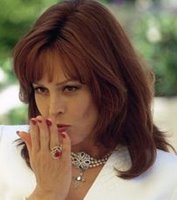
I’ve always thought Sigourney Weaver could get away with playing Jane Fonda’s sister, and the recent remake of The Omen has convinced me that if I were told that actors David Warner and David Thewlis were related, perhaps as father and son, but conceivably even oldest brother/youngest brother, I could believe it with virtually no leap of imagination.
3) Favorite special effects moment(s)
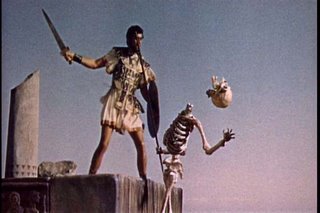 Classic: The first unraveling of Claude Rains (The Invisible Man, 1933); the titular creature stomping down an abandoned Nevada highway (Tarantula, 1955); marauding skeletons rising from the ground and bearing swords (Jason and the Argonauts, 1963); a football player inflated to weather balloon-size and bouncing toward the goal line (Son of Flubber, 1963).
Classic: The first unraveling of Claude Rains (The Invisible Man, 1933); the titular creature stomping down an abandoned Nevada highway (Tarantula, 1955); marauding skeletons rising from the ground and bearing swords (Jason and the Argonauts, 1963); a football player inflated to weather balloon-size and bouncing toward the goal line (Son of Flubber, 1963).Contemporary:
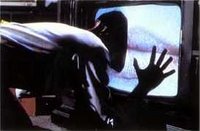 A giant arising from the sea with the boat on his head (Time Bandits, 1981); a stoner getting trisected by an airborne expanse of barbed-wire fence, his torso sliding apart and revealing an eruption of entrails and other red-colored goodies (Final Destination 2, 2003); that undulating TV set (Videodrome, 1983); and Babe looking out at the skyline of a glittering, bustling, overwhelming all-in-one metropolis (Babe: Pig in the City, 1998).
A giant arising from the sea with the boat on his head (Time Bandits, 1981); a stoner getting trisected by an airborne expanse of barbed-wire fence, his torso sliding apart and revealing an eruption of entrails and other red-colored goodies (Final Destination 2, 2003); that undulating TV set (Videodrome, 1983); and Babe looking out at the skyline of a glittering, bustling, overwhelming all-in-one metropolis (Babe: Pig in the City, 1998).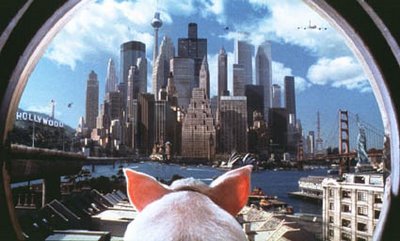
4) George Clooney or Matt Damon
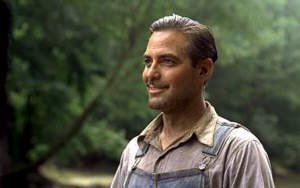 This official SLIFR concession to beefcake is, as it turns out, a pretty tough call for me. I first saw Matt Damon in Walter Hill’s Geronimo, where he came off rather nondescriptly in the presence of Wes Studi, Robert Duvall, Gene Hackman, and even Jason Patric. But soon I found myself looking forward to his appearances, thanks to terrific, committed work in movies like The Talented Mr. Ripley and Dogma, and he brings a surprising and welcome gravitas to the Bourne movies. But Clooney has that streak with Steven Soderbergh to brag on. He was disarmingly good in Out of Sight, Ocean’s Eleven and even the well-intended but underimagined Solaris. (I haven’t yet seen Syriana.) But he can also boast a hilarious cameo in Robert Rodriguez’s Spy Kids and, even better, two tours of duty with the Coen Bros. which revealed him to be a deft, energetic and resourceful comic actor. His turns in O Brother, Where Art Thou (“My hair!”) and Intolerable Cruelty reveal a character actor’s daring underneath all that not-so-useless beauty. They’re what really stake him, when combined with the suave charm of his appearances in the Soderbergh films, to the sort of legitimate movie star status that radiates from someone like Cary Grant. And he’s turning into a pretty good director too. Advantage: Clooney.
This official SLIFR concession to beefcake is, as it turns out, a pretty tough call for me. I first saw Matt Damon in Walter Hill’s Geronimo, where he came off rather nondescriptly in the presence of Wes Studi, Robert Duvall, Gene Hackman, and even Jason Patric. But soon I found myself looking forward to his appearances, thanks to terrific, committed work in movies like The Talented Mr. Ripley and Dogma, and he brings a surprising and welcome gravitas to the Bourne movies. But Clooney has that streak with Steven Soderbergh to brag on. He was disarmingly good in Out of Sight, Ocean’s Eleven and even the well-intended but underimagined Solaris. (I haven’t yet seen Syriana.) But he can also boast a hilarious cameo in Robert Rodriguez’s Spy Kids and, even better, two tours of duty with the Coen Bros. which revealed him to be a deft, energetic and resourceful comic actor. His turns in O Brother, Where Art Thou (“My hair!”) and Intolerable Cruelty reveal a character actor’s daring underneath all that not-so-useless beauty. They’re what really stake him, when combined with the suave charm of his appearances in the Soderbergh films, to the sort of legitimate movie star status that radiates from someone like Cary Grant. And he’s turning into a pretty good director too. Advantage: Clooney. 5) What is the movie you’ve encouraged more people to see than any other?
 Once upon a time, in the days after I graduated college in the spring of 1981, I can remember recommending Richard Rush’s The Stunt Man to an awful lot of people, many of whom I knew probably wouldn’t even like it. Recently I’ve sent several unsuspecting souls to a series of sweaty, sleepless nights by proselytizing on behalf of Takashi Miike’s Audition. And even more recently, I’ve been overheard extolling the virtues of Tex Avery’s Rock-a-Bye Bear. But over all, I’ve probably directed more people to Nashville than just about any other movie. Many of them simply indulged my enthusiasm and never bothered to watch it, and many who did follow through didn’t much care for it. But I daresay that some did and ended up liking it, and that’s good enough for me.
Once upon a time, in the days after I graduated college in the spring of 1981, I can remember recommending Richard Rush’s The Stunt Man to an awful lot of people, many of whom I knew probably wouldn’t even like it. Recently I’ve sent several unsuspecting souls to a series of sweaty, sleepless nights by proselytizing on behalf of Takashi Miike’s Audition. And even more recently, I’ve been overheard extolling the virtues of Tex Avery’s Rock-a-Bye Bear. But over all, I’ve probably directed more people to Nashville than just about any other movie. Many of them simply indulged my enthusiasm and never bothered to watch it, and many who did follow through didn’t much care for it. But I daresay that some did and ended up liking it, and that’s good enough for me.6) Favorite film of 1934

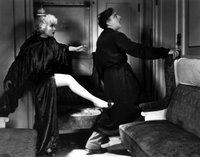
I’m glad Professor Kelp chose the word “favorite” for these categories. Doing so has allowed me to acknowledge It Happened One Night and It’s a Gift while admitting that my true favorite(s) from 1934 would be a tie between Edgar Ulmer’s The Black Cat and Howard Hawks’ Twentieth Century. (As a side note, a quick run through IMDb’s list of 1934 releases reveals a couple of movies with titles undoubtedly better than the movies themselves—the short The Busy Lesbians Club, the rather more suggestively titled Half-Baked Relations, and something or someone called Hanneles Himmelfahrt. Ain’t research grand?)
7) Favorite movie theater
When I first answered this question back in April 2005, I listed the Alger (Lakeview, Oregon), the Bijou (Eugene, Oregon) and the Vista (Los Angeles, California) as my favorites. But I’ve got another one for the ranks that I first visited just two months later:
 the Mission Tiki Drive-in in Montclair, California, where the drive-in flame has been rekindled for me and my wife, and where a whole new world was opened up for my girls when they saw their first drive-in movies-- Charlie and the Chocolate Factory and Wallace & Gromit and the Curse of the Were-rabbit-- last year. Now it’s their first choice for a place to see a movie, and I have to admit it’s usually mine too.
the Mission Tiki Drive-in in Montclair, California, where the drive-in flame has been rekindled for me and my wife, and where a whole new world was opened up for my girls when they saw their first drive-in movies-- Charlie and the Chocolate Factory and Wallace & Gromit and the Curse of the Were-rabbit-- last year. Now it’s their first choice for a place to see a movie, and I have to admit it’s usually mine too.8) Irene Dunne or Jean Arthur
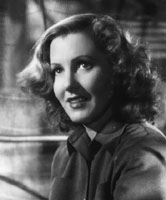 I’m not as familiar with Irene Dunne as I probably should be. In the films of hers that I have seen, The Awful Truth (which I loved) and Penny Serenade (which I did not love), she’s seemed to me a bit too mannered, lacking the freeness of spirit that characterizes my favorite screwball comedy actresses, women like Carole Lombard, and Katharine Hepburn, and Jean Arthur. Arthur is effervescent and intelligent in gems like The More The Merrier, You Can’t Take It With You and Talk of the Town, even better in Meet John Doe, Mr. Smith Goes to Washington and, most especially, Only Angels Have Wings. Like most of my favorite actors, male and female variety, not only is she exciting to watch, but she seems, in every one of the movies I’ve seen her in, like someone I’d want to spend time with. Advantage: Arthur.
I’m not as familiar with Irene Dunne as I probably should be. In the films of hers that I have seen, The Awful Truth (which I loved) and Penny Serenade (which I did not love), she’s seemed to me a bit too mannered, lacking the freeness of spirit that characterizes my favorite screwball comedy actresses, women like Carole Lombard, and Katharine Hepburn, and Jean Arthur. Arthur is effervescent and intelligent in gems like The More The Merrier, You Can’t Take It With You and Talk of the Town, even better in Meet John Doe, Mr. Smith Goes to Washington and, most especially, Only Angels Have Wings. Like most of my favorite actors, male and female variety, not only is she exciting to watch, but she seems, in every one of the movies I’ve seen her in, like someone I’d want to spend time with. Advantage: Arthur.9) Favorite film made for children
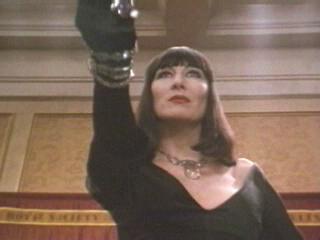 To my mind, the best movies for children are those that take into account their emotional intelligence and their capacity for wonder, for curiosity, for fright. They also respect the possibility that the movies, by taking children out of themselves and into places that might satisfy wonder and curiosity and their capacity for being scared, might expand their expectations and their openness to all the other experiences that great movies, and even merely good ones, can hold in store. Four movies that fulfill this standard for me are: Nick Park and Steve Box’s Wallace & Gromit and the Curse of the Were-rabbit (actually, any of the Wallace & Gromit shorts too); Chris Noonan’s Babe; George Miller’s Babe: Pig in the City; and Nicolas Roeg’s adaptation of Roald Dahl’s The Witches.
To my mind, the best movies for children are those that take into account their emotional intelligence and their capacity for wonder, for curiosity, for fright. They also respect the possibility that the movies, by taking children out of themselves and into places that might satisfy wonder and curiosity and their capacity for being scared, might expand their expectations and their openness to all the other experiences that great movies, and even merely good ones, can hold in store. Four movies that fulfill this standard for me are: Nick Park and Steve Box’s Wallace & Gromit and the Curse of the Were-rabbit (actually, any of the Wallace & Gromit shorts too); Chris Noonan’s Babe; George Miller’s Babe: Pig in the City; and Nicolas Roeg’s adaptation of Roald Dahl’s The Witches.10) Favorite Martin Scorsese Movie
Though I love many of Scorsese’s films-- Mean Streets, Taxi Driver, The Last Temptation of Christ, New York, New York, The Last Waltz and Kundun-- I have to count myself among those who think of him as a great director who has yet to come up with a truly great film. (For me, Mean Streets probably comes closest.) In considering him a great director, I think he’s probably been as important as a force for the preservation of movie history, and for highlighting older films in relevant discussions through his documentaries A Personal Journey Through American Movies with Martin Scorsese and My Voyage to Italy, than as a director of original works. And though there is obviously much to admire about oft-cited movies like Raging Bull and GoodFellas, I think there’s just as much to question in them as well. But since this query asks for a “favorite,” not a “best,” my choice is a much simpler one.
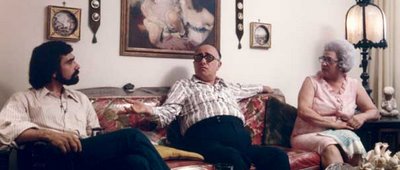 I love Scorsese’s documentaries, including all of the ones mentioned above, but my favorite is Italian/American, in which he interviews his parents about their family history and living in New York’s Little Italy district. Both Mama and Papa come across as complicated, entertaining raconteurs as they recount stories of their youth, and their son’s, and effortlessly weave a vibrant portrait of the Italian immigrant experience from casual conversation.
I love Scorsese’s documentaries, including all of the ones mentioned above, but my favorite is Italian/American, in which he interviews his parents about their family history and living in New York’s Little Italy district. Both Mama and Papa come across as complicated, entertaining raconteurs as they recount stories of their youth, and their son’s, and effortlessly weave a vibrant portrait of the Italian immigrant experience from casual conversation.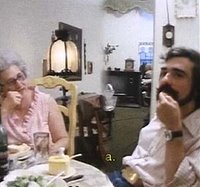 Scorsese’s punctuates the stories by occasionally following his mother into the kitchen, where she is preparing spaghetti for him and his crew, and the movie’s end credits divulge her secret recipe. Before their deaths, Scorsese always found small roles for his parents in his films—Mama was particularly natural and memorable as Joe Pesci’s mom in GoodFellas-- but Italian/American is their finest hour, and it may be their son’s purest as well.
Scorsese’s punctuates the stories by occasionally following his mother into the kitchen, where she is preparing spaghetti for him and his crew, and the movie’s end credits divulge her secret recipe. Before their deaths, Scorsese always found small roles for his parents in his films—Mama was particularly natural and memorable as Joe Pesci’s mom in GoodFellas-- but Italian/American is their finest hour, and it may be their son’s purest as well.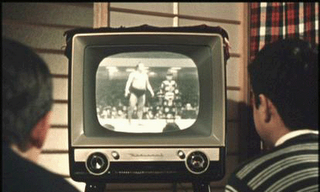 11) Favorite film about children
11) Favorite film about childrenYazujiro Ozu’s Good Morning (Ohayo)
12) Favorite film of 1954
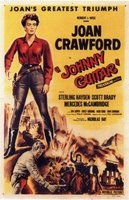 More nifty titles popped out of the IMDb archive for 1954: The Gay Dog, and an industrial short by Herk Harvey (Carnival of Souls) entitled What About Drinking?
More nifty titles popped out of the IMDb archive for 1954: The Gay Dog, and an industrial short by Herk Harvey (Carnival of Souls) entitled What About Drinking? Again, taking advantage of Professor Kelp’s semantic preference, I’ll admit to a serious love for Rear Window, La Strada and Gojira (Godzilla, King of the Monsters) while also admitting that my favorite(s) of 1954 are, again, a tie between Nicholas Ray’s Johnny Guitar and Akira Kurosawa’s Seven Samurai. Okay, I’m spineless. I admit that too.
Again, taking advantage of Professor Kelp’s semantic preference, I’ll admit to a serious love for Rear Window, La Strada and Gojira (Godzilla, King of the Monsters) while also admitting that my favorite(s) of 1954 are, again, a tie between Nicholas Ray’s Johnny Guitar and Akira Kurosawa’s Seven Samurai. Okay, I’m spineless. I admit that too.13) Favorite screenplay written by a writer better known for literature than screenplays
 It’s hard to find fault with the adaptations James Agee turned in for Charles Laughton and John Huston-- The Night of the Hunter and The African Queen, respectively. But if I’m honest, I’m almost as tickled that Roald Dahl wrote the screenplay for my favorite James Bond movie, You Only Live Twice, as I am at the movie itself. As I am unfamiliar with the books, please forgive me in advance if the dialogue actually comes from Ian Fleming, but this exchange, while sounding so much like top-drawer Bondian sexual innuendo, also has about it a whiff of Dahl’s acid wit as well (thank you to IMDb for making it so I didn’t have to drive home and dig out my DVD for this morsel):
It’s hard to find fault with the adaptations James Agee turned in for Charles Laughton and John Huston-- The Night of the Hunter and The African Queen, respectively. But if I’m honest, I’m almost as tickled that Roald Dahl wrote the screenplay for my favorite James Bond movie, You Only Live Twice, as I am at the movie itself. As I am unfamiliar with the books, please forgive me in advance if the dialogue actually comes from Ian Fleming, but this exchange, while sounding so much like top-drawer Bondian sexual innuendo, also has about it a whiff of Dahl’s acid wit as well (thank you to IMDb for making it so I didn’t have to drive home and dig out my DVD for this morsel): [James is in bed with a Ling, a Chinese woman]
James Bond: Why do Chinese girls taste different from all other girls?
Ling: You think we better, huh?
James Bond: No, just different. Like Peking Duck is different from Russian Caviar. But I love them both.
Ling: Darling, I give you very best duck.
14) Walter Matthau or Jack Lemmon
I always loved Jack Lemmon when I was a kid. But by the time he started appearing in gaseous junk like Tribute (1980), That’s Life! (1986) and Dad (1989), the actor I once loved in Billy Wilder films and in Mister Roberts disappeared and reconstituted himself as a promoter of relentless, tic-ridden, sodden and in-your-face sentimentality. The last straw for me was his misdirected appearance in Robert Altman’s Short Cuts, where the actor, adrift on a sea of mawkish theatricality, underlined every effect in his big showcase speech with enough sledgehammer emphasis to blow away the back row of the theater, all the while Altman’s camera kept creeping closer, as if to interpret the great chunks of baloney Lemmon kept telegraphing to the audience as found nuggets of subtly transmitted truth. Walter Matthau, on the other hand, was a brilliant comic actor (The Fortune Cookie, The Odd Couple, A Guide for the Married Man, A New Leaf) who made the transition to dramatic fare in the early ‘70s with barely a misstep. And where Lemmon would wring his everyman status for as much pathos (Save the Tiger) and back-off-man-you’re-too-close-to-the-camera intensity (The China Syndrome) as any audience could possibly bear, Matthau comported himself through films like Kotch, Pete and Tillie, Casey’s Shadow, Hopscotch and a memorable cameo in JFK
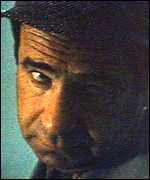 with utter confidence in his own weary, sometimes vinegary personality, and he never once begged to be liked or understood or sympathized with. And at the same time he was still turning in sharp comic performances in movies like The Sunshine Boys, The Front Page, House Calls, The Survivors, Grumpy Old Men, Dennis the Menace, Out to Sea and even Billy Wilder’s last movie, Buddy Buddy, which is better and funnier than its reputation would lead anyone to believe, due in no small part to Matthau’s caustic, grotesquely, hilariously overscaled work as a hit man trying, with no luck, to off a suicidal Lemmon. It’s Matthau in a walk for all these reasons. But even if all those reasons were erased, I’d still pick him on the strength of three movies: Charley Varrick, The Taking of Pelham One-Two-Three and The Bad News Bears, a early-to-mid ‘70s trifecta of excellence that cements him not only as the choice over Lemmon, but into my pantheon of all-time favorite actors as well. Advantage: Matthau.
with utter confidence in his own weary, sometimes vinegary personality, and he never once begged to be liked or understood or sympathized with. And at the same time he was still turning in sharp comic performances in movies like The Sunshine Boys, The Front Page, House Calls, The Survivors, Grumpy Old Men, Dennis the Menace, Out to Sea and even Billy Wilder’s last movie, Buddy Buddy, which is better and funnier than its reputation would lead anyone to believe, due in no small part to Matthau’s caustic, grotesquely, hilariously overscaled work as a hit man trying, with no luck, to off a suicidal Lemmon. It’s Matthau in a walk for all these reasons. But even if all those reasons were erased, I’d still pick him on the strength of three movies: Charley Varrick, The Taking of Pelham One-Two-Three and The Bad News Bears, a early-to-mid ‘70s trifecta of excellence that cements him not only as the choice over Lemmon, but into my pantheon of all-time favorite actors as well. Advantage: Matthau.15) Favorite character name
Oh, how disappointed I was when Puggy D stole my thunder and mentioned Trudy Kockenlocker (Betty Hutton) from Preston Sturges’ great comedy The Miracle of Morgan’s Creek! That name is still my favorite, but since I didn’t get to it first I feel this irrational need to come up with another name. (Somebody also invoked the name of the father of Trudy’s expected, Ignatz Ratskiwatski-- sp?).
 I like the hardened, homicidal undertones of the name Virgil Starkwell contrasted with the familiar persona of Woody Allen in Take the Money and Run. I like Groucho’s J. Cheever Loophole from At the Circus, but probably because it reminds me of Graham Chapman’s even funnier Raymond Luxury-Yacht (mispronounced “Yatch-t” by Michael Palin, Chapman haughtily corrects him: “It’s spelled Raymond Luxury-Yacht, but it’s pronounced ‘Throatwobbler Mangrove!’”) All of these make me giggle like a schoolgirl, but the one that makes me giggle and gasp just a little comes from Beyond the Valley of the Dolls, in which Roger Ebert and Russ Meyer mix up their portrayal of a healthy, “normal” sexual relationship between two African-American characters (rather unusual for 1970) with a little jolt of politically incorrect humor. Petronella Danforth (Marcia McBroom) has taken up a romance with hard-working ambitious law student Emerson Thorne (Harrison Page). But she betrays him by dallying briefly with a studly prizefighter (James Inglehart, in a pretty funny Muhammad Ali takeoff) who turns out not only to be a stallion in the bedroom but also a bit unstable, and maybe even homicidal, as well. His moniker: Randy Black.
I like the hardened, homicidal undertones of the name Virgil Starkwell contrasted with the familiar persona of Woody Allen in Take the Money and Run. I like Groucho’s J. Cheever Loophole from At the Circus, but probably because it reminds me of Graham Chapman’s even funnier Raymond Luxury-Yacht (mispronounced “Yatch-t” by Michael Palin, Chapman haughtily corrects him: “It’s spelled Raymond Luxury-Yacht, but it’s pronounced ‘Throatwobbler Mangrove!’”) All of these make me giggle like a schoolgirl, but the one that makes me giggle and gasp just a little comes from Beyond the Valley of the Dolls, in which Roger Ebert and Russ Meyer mix up their portrayal of a healthy, “normal” sexual relationship between two African-American characters (rather unusual for 1970) with a little jolt of politically incorrect humor. Petronella Danforth (Marcia McBroom) has taken up a romance with hard-working ambitious law student Emerson Thorne (Harrison Page). But she betrays him by dallying briefly with a studly prizefighter (James Inglehart, in a pretty funny Muhammad Ali takeoff) who turns out not only to be a stallion in the bedroom but also a bit unstable, and maybe even homicidal, as well. His moniker: Randy Black.16) Favorite screenplay adapted from a work of great literature, either by the author or by someone else
 Putting the word “great” in there really does make it difficult just to toss off an answer to this question, doesn’t it? I can think of a lot of terrific films adapted from great works of literature, but an alarming number of them were made from books I haven’t read (I can only bring myself to give one example here, lest I come across as a complete illiterate-- Kazuo Ishiguro’s The Remains of the Day). Also, the screenplay credited to Leigh Brackett for Robert Altman’s reimagining of Raymond Chandler’s The Long Goodbye seems too much subjected to the director’s usual improvisation to be considered on its own (although there is a case to be made for Joan Tewkesbury’s adaptation of Edward Anderson’s novel Thieves Like Us.) For me, the question can be best answered, on its own terms, by remembering the wonderful screenplay crafted by John Steinbeck and Mexican actor-director Emilio Fernandez in adapting Steinbeck’s devastating novella of poverty and family tragedy, The Pearl (La Perla) (1947). Honorable mention: David Cronenberg’s Naked Lunch.
Putting the word “great” in there really does make it difficult just to toss off an answer to this question, doesn’t it? I can think of a lot of terrific films adapted from great works of literature, but an alarming number of them were made from books I haven’t read (I can only bring myself to give one example here, lest I come across as a complete illiterate-- Kazuo Ishiguro’s The Remains of the Day). Also, the screenplay credited to Leigh Brackett for Robert Altman’s reimagining of Raymond Chandler’s The Long Goodbye seems too much subjected to the director’s usual improvisation to be considered on its own (although there is a case to be made for Joan Tewkesbury’s adaptation of Edward Anderson’s novel Thieves Like Us.) For me, the question can be best answered, on its own terms, by remembering the wonderful screenplay crafted by John Steinbeck and Mexican actor-director Emilio Fernandez in adapting Steinbeck’s devastating novella of poverty and family tragedy, The Pearl (La Perla) (1947). Honorable mention: David Cronenberg’s Naked Lunch.17) Favorite film of 1974
The year 1974 was a much better one than I remembered. Either that, or it just seems loaded with movies that I loved when I was 14 or have come to love dearly in the time since they were released that year—movies like Big Bad Mama, Chinatown, The Conversation, Gone in 60 Seconds, The Golden Voyage of Sinbad, The Groove Tube, Hearts and Minds, Herbie Rides Again, General Idi Amin Dada, The Island at the Top of the World, The Longest Yard, Mahler, Monty Python and the Holy Grail, The Parallax View, Thieves Like Us and Thunderbolt and Lightfoot.
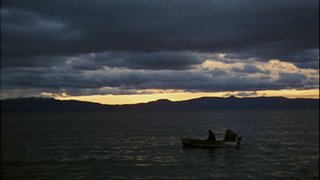 But even after a list like that one, there are still five movies that came out that year that I have decided to rank in ascending order, just because I wanted to point out a plethora of true favorites while acknowledging that, for me, there can only be one real choice for 1974. Coming in at number 5): Joseph Sargent’s The Taking of Pelham One Two Three; 4) Martin Scorsese’s Italian/American; 3) Tobe Hooper’s The Texas Chainsaw Massacre; 2) Mel Brooks’ Blazing Saddles; and number one, of course, with several bullets, Francis Ford Coppola’s The Godfather Part II.
But even after a list like that one, there are still five movies that came out that year that I have decided to rank in ascending order, just because I wanted to point out a plethora of true favorites while acknowledging that, for me, there can only be one real choice for 1974. Coming in at number 5): Joseph Sargent’s The Taking of Pelham One Two Three; 4) Martin Scorsese’s Italian/American; 3) Tobe Hooper’s The Texas Chainsaw Massacre; 2) Mel Brooks’ Blazing Saddles; and number one, of course, with several bullets, Francis Ford Coppola’s The Godfather Part II.18) Joan Severance or Shannon Tweed
 Though I’m incapable to thinking of one Shannon Tweed film off the top of my head other than Cannibal Women in the Avocado Jungle of Death, it’s her curvaceous, much warmer presence in a walk over Severance’s brittle countenance. Tweed is carrying herself into her 50s (!) in such a way as might garner the Angie Dickinson Seal of Approval—if only Tweed could find her Brian de Palma. But was I the only one who didn’t know that she’s been bearing Gene Simmons’ children for 15 years or so? Advantage: Tweed.
Though I’m incapable to thinking of one Shannon Tweed film off the top of my head other than Cannibal Women in the Avocado Jungle of Death, it’s her curvaceous, much warmer presence in a walk over Severance’s brittle countenance. Tweed is carrying herself into her 50s (!) in such a way as might garner the Angie Dickinson Seal of Approval—if only Tweed could find her Brian de Palma. But was I the only one who didn’t know that she’s been bearing Gene Simmons’ children for 15 years or so? Advantage: Tweed.19) jackass: the movie-- yes or no?
Absolutely. My sister-in-law once expressed curiosity about it, and after a few minutes taken to make her decision, she decided to see for herself. I’ll always respect her for her pluck in that situation, even though she could only endure it for about 25 minutes.
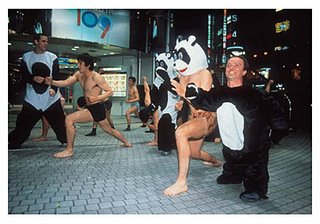 And my favorite comment re jackass: the movie, if I might cannibalize the comments column already, comes from Chris Oliver, who added as an afterthought to his list of responses, that the movie would play exceptionally well as a double feature with Y Tu Mama Tambien: “Viewed together, these two films provide a fantastic amount of insight into the homoerotic nature of male bonding.” All that, plus roller-skating in panda costumes through the streets of Tokyo!
And my favorite comment re jackass: the movie, if I might cannibalize the comments column already, comes from Chris Oliver, who added as an afterthought to his list of responses, that the movie would play exceptionally well as a double feature with Y Tu Mama Tambien: “Viewed together, these two films provide a fantastic amount of insight into the homoerotic nature of male bonding.” All that, plus roller-skating in panda costumes through the streets of Tokyo!20) Favorite John Cassavetes film
Here (and coming after an endorsement of jackass: the movie, I’m sure this’ll be a real credibility-builder) I have to confess a lot of impatience and/or intolerance with the “methodology” of Cassavetes who, as a director, seems cripplingly overindulgent of his actors and far too reliant on his confidence that truth will somehow emerge from the confluence of the rambling improvisational style he presides over on the set and the Moviola he operates in the editing room.
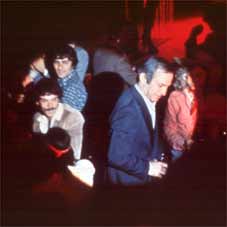 Don’t get me wrong—Cassavetes on his worst day (Husbands) is no Henry Jaglom. I like a lot of Shadows and parts of A Woman Under the Influence just fine. But every time I see a Cassavetes movie I come away convinced that there’s not nearly as much going on there as he, his cast, and his admirers seem to think there is. Still, I have to pick a favorite, so I’ll pick the muted, ramshackle existential nightmare on display in The Killing of a Chinese Bookie, or perhaps the poisoned, heartbreaking emotions at the heat of Love Streams. Ultimately, though, I like Cassavetes better as an actor, in those projects, like The Dirty Dozen, Rosemary’s Baby and The Fury, when he was busy “whoring himself” to make money so he could pour himself into a shapeless mess like Opening Night.
Don’t get me wrong—Cassavetes on his worst day (Husbands) is no Henry Jaglom. I like a lot of Shadows and parts of A Woman Under the Influence just fine. But every time I see a Cassavetes movie I come away convinced that there’s not nearly as much going on there as he, his cast, and his admirers seem to think there is. Still, I have to pick a favorite, so I’ll pick the muted, ramshackle existential nightmare on display in The Killing of a Chinese Bookie, or perhaps the poisoned, heartbreaking emotions at the heat of Love Streams. Ultimately, though, I like Cassavetes better as an actor, in those projects, like The Dirty Dozen, Rosemary’s Baby and The Fury, when he was busy “whoring himself” to make money so he could pour himself into a shapeless mess like Opening Night. 21) First R-rated film you ever saw
21) First R-rated film you ever saw When I was 12 years old, I talked my mom into taking me and a buddy to the Circle JM Drive-in to see Dirty Harry. I remember, while she was trying to decide whether to take me or not, listening to her stammer and halt in describing how she had trouble with R-rated movies because of the way they typically went about “perverting sex.” I also remember thinking it odd that she’d be more concerned with perverse sex in Dirty Harry than the extreme violence that the film was obviously built around. She finally acquiesced. Unfortunately, she also decided to bring along my 11-year-old sister, who insisted on objecting loudly every time there was a naked breast seen on screen, an extremely uncool move that I thought sure would lead to Mom insisting on an early exit. We made it all the way through, though, and I did survive. Would I take my 12-year-old to see Dirty Harry? Probably not. But I’m glad my mom did. It’s one of those great, very early moments I think back on in my still ongoing development as a discerning fan of cinema (and of extreme violence, too, of course!), and I appreciate to this day her parental indiscretion.
22) Favorite X-rated film (remember that, while your answer may well be a famous or not-so-famous hard-core film, the "X" rating was once also a legitimate rating that did not necessarily connote pornography)
 Sorry I can’t force myself to be a little more disciplined on this one, but it seems that if I have an answer to this question, it’s a two, perhaps three-pronged answer. Prong number one: Ken Russell’s The Devils. Prong number two: Russ Meyer’s Beyond the Valley of the Dolls. And if there is a third prong (that’d make it the devil’s trident, wouldn’t it?), it’d be Ralph Bakshi’s adaptation of R. Crumb’s Fritz the Cat (a movie Crumb hated).
Sorry I can’t force myself to be a little more disciplined on this one, but it seems that if I have an answer to this question, it’s a two, perhaps three-pronged answer. Prong number one: Ken Russell’s The Devils. Prong number two: Russ Meyer’s Beyond the Valley of the Dolls. And if there is a third prong (that’d make it the devil’s trident, wouldn’t it?), it’d be Ralph Bakshi’s adaptation of R. Crumb’s Fritz the Cat (a movie Crumb hated).23) Favorite film of 1994
There’s Peter Jackson’s Heavenly Creatures, Tim Burton’s Ed Wood, Spike Lee’s Crooklyn and even Adam Resnick’s (and Chris Elliot’s) Cabin Boy, an annual favorite that I throw on when I’m wrapping Christmas gifts. But my favorite(s)—there’s that bracketed “s” again—are at least thematically related this time.

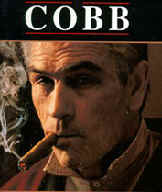 Easily the movies
Easily the moviesI hold in highest regard from 1994 are Ron Shelton’s brutal, funny and uncomfortably clear-eyed biography of the great baseball player (and ugly human being) Ty Cobb, and Ken Burns’ monumental, exhaustive, imperfect and hugely entertaining historical documentary Baseball. These two movies did more to spark my love of the game than just about anything else, especially during the grim years at Dodger Stadium that were presided over by the baseball geniuses at Fox. (Things are getting grim enough again around Chavez Ravine this season that I’m beginning to wish Burns would do an update, or that Shelton would do a bio of Ted Williams.)
24) Describe a moment in a film that made you weep
I wept through the entirety of Babe and The Lord of the Rings: The Return of the King, and most of Million Dollar Baby, so I’ll set them aside for now—I’ve wasted enough Kleenex on them.
 For a specific moment, though, I’ll pick the conclusion of Fellini’s Nights of Cabiria, when Cabiria, seemingly at her lowest point, gathers herself up and begins walking down a road, apparently destroyed, toward God knows what. But as she continues she accelerates her pace slightly, and after a few minutes she’s got a smile on her face, overjoyed that she’s come out the other end of this experience and is still alive and capable of feeling the world around her. My wife and I saw the luminous Rialto Pictures theatrical re-release in the summer of 1998, not quite a year after suffering a devastating personal tragedy of our own. As we walked out of the theater, my own happiness about the picture swelled into a profound wave of emotion brought on by the afterglow of Cabiria’s resolve. All I remember is walking down the sidewalk and trying to formulate words to express my appreciation of the film to my wife, and suddenly dissolving into tears.
For a specific moment, though, I’ll pick the conclusion of Fellini’s Nights of Cabiria, when Cabiria, seemingly at her lowest point, gathers herself up and begins walking down a road, apparently destroyed, toward God knows what. But as she continues she accelerates her pace slightly, and after a few minutes she’s got a smile on her face, overjoyed that she’s come out the other end of this experience and is still alive and capable of feeling the world around her. My wife and I saw the luminous Rialto Pictures theatrical re-release in the summer of 1998, not quite a year after suffering a devastating personal tragedy of our own. As we walked out of the theater, my own happiness about the picture swelled into a profound wave of emotion brought on by the afterglow of Cabiria’s resolve. All I remember is walking down the sidewalk and trying to formulate words to express my appreciation of the film to my wife, and suddenly dissolving into tears. 25) Ewan McGregor or Ewen Bremner
Bremner’s logorrheic ranting in Naked, and his diarrheic hi-jinks in Trainspotting would seem to be enough to warrant a recommendation here. But I don’t know if my wife would ever forgive me if I didn’t pick Ewan McGregor.
 Besides, I really did like him in Shallow Grave, Trainspotting, Brassed Off, Moulin Rouge, Down with Love and Big Fish, and that whole motorcycling across Europe and America thing with Charlie Boorman was pretty cool too, so there can really be only one choice for me. Advantage: McGregor.
Besides, I really did like him in Shallow Grave, Trainspotting, Brassed Off, Moulin Rouge, Down with Love and Big Fish, and that whole motorcycling across Europe and America thing with Charlie Boorman was pretty cool too, so there can really be only one choice for me. Advantage: McGregor.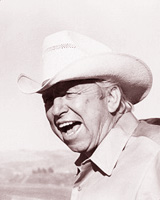 26) One of your favorite line readings (not necessarily one of your favorite lines) from this or any year
26) One of your favorite line readings (not necessarily one of your favorite lines) from this or any yearMy God, there must be a million of ‘em floating around in the space between my ears, and as I tried to grasp for one or two of those ethereal straws, my mind kept landing back on one name: Slim Pickens. Surely the way Pickens wraps himself around confounded exclamations like “Holy Mother o’ Pearl!” or “What in the wide, wide world o’ sports is a-goin’ on here?!” (Blazing Saddles) would be great enough to qualify. But those are great readings coupled with lines that are pretty hilarious themselves. Instead, I followed Pickens off the shores of Santa Monica in 1941, where he is being held captive by a crew of nonplussed Japanese sailors in a fog-cloaked submarine. They want to know the location of Hollywood so they can do a torpedo job on this Great American City. Among the personal items found upon Pickens’ character (whose name, Hollis “Holly” Wood, is what gets him roped and tied by his Nipponese captors in the first place) is a box of “dee-licious, noo-tritious Popper Jacks” which just happens to have a toy compass as a prize inside. When it finally dawns on Pickens just what these boys, and their sinister German confederate (Christopher Lee), are really up to, he grabs the compass and swallows it, which leads to him ingesting, under duress, a whole lot of castor oil. The film cuts away from Pickens’ nasty situation for a few minutes, and then goes back to the submarine, where the camera dollies in on a doorway, which opens to reveal Pickens on the toilet, where he snarls, as only Pickens could, “You boys ain’t gettin’ shit outta me!” The line, not as good as “Holy Mother o’ Pearl!” and just a shade obvious, is rendered perfectly hilarious by Pickens’ defiance and deadpan lack of awareness that he’s even addressed the reality of his circumstances. And it is even more perfectly topped later when Pickens fakes some extremely exaggerated grunting so that his captors will think he’s had the Mother (o’ Pearl) of All Bowel Movements and rush into the W.C., where he will ambush them and attempt to escape. There is a beautiful slow dolly in on the face of the Japanese submarine captain (Toshiro Mifune) as the grunting escalates into near hysteria. He grumbles in Japanese (with very helpful English subtitles) while draped with faint dejection over the ship’s periscope, “This has not been honorable.” Another great line reading.
 27) What, if any, element in a film would, upon your hearing about it beforehand, would prejudice you against seeing that film or keeping an open mind about it?
27) What, if any, element in a film would, upon your hearing about it beforehand, would prejudice you against seeing that film or keeping an open mind about it?I refuse to see Irreversible, and director Gaspar Noe would probably think I was some kind of pussy for that refusal, because the depiction of rape on screen physically repulses me and fills me with a helpless sense of sorrow and empathy with the victim. Even if it is artistically justifiable (the horrifically sudden stairwell assault on Dr. Jennifer Malfi in The Sopranos), I still don’t want to see it.
 But if it’s going to be sprung on me unexpectedly, as it was when an unhinged Tim Roth brutalized Jessica Lange in Michael Caton-Jones’ marvelous Rob Roy, let there at least be a moment like the one afforded Lange in the aftermath. Roth leaves her crumpled on the floor, she gathers herself with as much dignity as she can muster, and carries herself silently out the front door and across the rocky beach in front of her house, finally coming to rest as she squats in the water and cleans herself, tears silently rolling down her cheeks.
But if it’s going to be sprung on me unexpectedly, as it was when an unhinged Tim Roth brutalized Jessica Lange in Michael Caton-Jones’ marvelous Rob Roy, let there at least be a moment like the one afforded Lange in the aftermath. Roth leaves her crumpled on the floor, she gathers herself with as much dignity as she can muster, and carries herself silently out the front door and across the rocky beach in front of her house, finally coming to rest as she squats in the water and cleans herself, tears silently rolling down her cheeks. 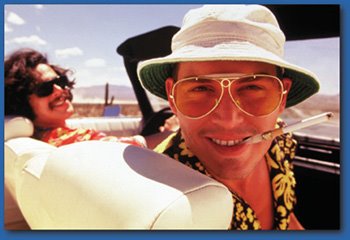 28) Favorite Terry Gilliam film
28) Favorite Terry Gilliam filmI recently saw Brazil again after 15 or so years and had to re-evaluate my once-soaring opinion of it—in 2006 it seems kind of small and overly pleased with itself to me. I prefer the rogue tiger Gilliam lets loose, in himself, his actors, his mise-en-scene, in his brilliant high-wire adaptation of Hunter S. Thompson’s Fear and Loathing in Las Vegas. The relatively quiet moment when Gilliam stages Thompson staring out his hotel room window and summing up in narration the dashed hopes of a generation (“With the right kind of eyes, you can almost see where the wave crested and broke”) is one of the movies’ best aesthetic justifications of the more-often exhausted concept of a montage built around existing newsreel footage. And I’ll always be grateful that Gilliam’s visualization of the book’s hilarious Circus Circus episode was even better than the one that’s always played out in my mind.
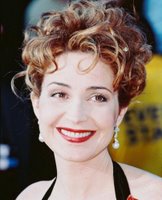 29) Jean Smart or Annie Potts
29) Jean Smart or Annie Potts Jean Smart undeniably has far more range as an actress, and one of the minor pleasures of watching movies (and TV) in the ‘90s and the ‘00s has been seeing just how good she gets as she gets older. But Annie Potts stole my heart in Corvette Summer, and despite the occasional attempt to convince me to leave her by the side of the road (King of the Gypsies) I remain true to this day. And it’s already been said here, probably more times than I’m even aware, but I’ll say it again: “Ghostbusters! Whaddayawant?” Advantage: Potts.
30) Is it possible to know with any certainty whether or not you could love someone based partially on their taste in movies? If yes, is there any one film that might be a deal-breaker, or a dealmaker?
When we were dating, my wife often expressed impatience and outright contempt for what she termed the manipulative tendencies of Robert Altman, and she repeatedly said that she didn’t know what the big deal was about Nashville. And I have never been coy about my distaste for two of her favorites, West Side Story and The Princess Bride. But truth be told, there’s a lot more to speak of that we have in common, cinematic sensibility-wise and in terms of specific titles too, so I feel like just about any disagreements about specific films can be overcome or offset by the discovery of other titles where togetherness can be fostered and celebrated. (Despite her enjoyment of Mission: Impossible, she still hasn’t given De Palma much quarter, however; the old misogyny argument rages on.) I don’t think there’s any particular film that I can think of that would be a deal-breaker. The closest thing I can imagine in that arena would be an open disdain for the movies as a whole, or as an art form. I can’t imagine coexisting with anyone who couldn’t find at least one moment in the movies to which there was no other option than total surrender.
************************************************************************************
This will probably be my last post for a couple of weeks, barring the occasional quick notice here and there. Life outside the blogosphere has ratcheted up a notch as we move toward the beginning of August—there’s a major housecleaning project on my horizon, and it’s all tied in with visiting relatives who arrive this weekend; a potentially lengthy and detailed interview project is begging to be finished; tomorrow (Friday) night the Southern California Drive-In Movie Society will be shooting an episode of Huell Howser’s California Gold to air on PBS the following weekend; the Mission Tiki’s 50th anniversary party—the Tiki Invasion—gets underway next Saturday, August 5 (and I probably will break my own imposed silence to write about that next week); work at the office is getting busier; and on top of all that, I’m trying to study for my CBEST exam, scheduled for August 12, after which (when I pass with flying colors!) I will begin substitute teaching, the first step on a long road toward getting my teaching certificate (and eventually my Masters) and becoming what I’ve toyed with becoming for several years now-- a schoolteacher. That’s a lot to pack into the next two weeks, so if something’s gotta give, I think it’s gotta be Sergio Leone and the Infield Fly Rule, at least until after August 12.
Speaking of that pesky title, thank you to everyone who took the time to offer their thoughts regarding my recent episode during which I considered changing the title of the blog. There was plenty of impassioned commentary in favor of leaving it just as it is, as well as some very funny, tongue-in-cheek suggestions for replacements. But reader Herecreepwretch brought it all into focus, for me and several others, with his very convincing words and evocation of American poet laureate Donald Hall. (That Criterion DVD that I offered up as a prize to whoever came up with the name change that I eventually picked? It's yours, Herecreepwretch. Thanks! Just e-mail me so you can tell me what you want and I'll know here to send it.)
If you haven’t you offered up your responses to Professor Kelp's Chemistry Test and would still like to, please don’t think that the party’s over. Again, I’m going to try to come up with a round-up of sorts compiling the best, funniest, most illuminating answers into one all-purpose easy-to-read post, and that’s probably not gonna happen for another month or so. So if you have answers, let’s hear ‘em— I know several have yet to chime in, and we’ll definitely wait for you, because you always make it worth the wait.
But for now, consider this a sort of leave of absence, a recharging of batteries, and an opportunity to tend to the less glamorous, though no less important aspects of life that can often get away from us (me) while we’re (I’m) focusing on all the fun, creative, expressive stuff. And then there’s that test. Wish me luck! I’m nervous, of course, but confident that it’ll all turn out well, that finally I’m on the course I should have been on 10 years ago. I’m still not too old to become a teacher, but I’m also extremely glad that I’ve finally gotten off my ass about the whole idea and am doing something constructive about it. And no matter what I may say about being too old or tired, I’ll, of course, keep you posted.
See you in a couple of weeks!
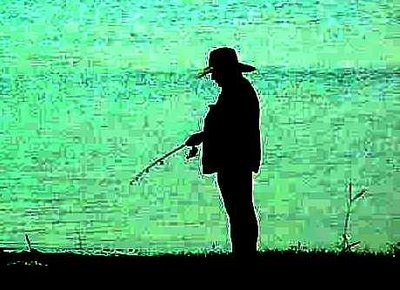



















4 comments:
Good luck! We will all, undoubtedly, "yearn for you tragically."
Great answers, Dennis, and I'm really glad to hear you're keeping the name.
I'll wish you luck on your test, though I doubt you'll need it. Probably more helpful for me to wish you luck with substituting, so let me do that too.
Have a great break from blogging!
i put mine up at www.pinkmoose.blogspot.com...if you have any interest?
Thanks, Anthony, for your answers! I'll probably copy them and post them in the Quiz comments section, unless you want to do so.
Post a Comment